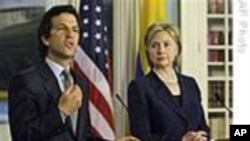French President Nicolas Sarkozy says the possibility of a nuclear weapons-armed Iran is the most serious crisis facing the world. Mr. Sarkozy said that the nations of the world need to increase sanctions on Tehran to convince the government to stop activities that would enable Iran to produce nuclear weapons, which he termed "unacceptable".
U.S. State Department deputy spokesman Tom Casey says that the United States is also "very concerned" about Iran's nuclear program, as well as its support for terrorism in the Middle East and its destructive meddling in Iraq:
"That said, the President [George W. Bush] has made it quite clear that, while no options are ever taken off the table, we are pursuing a diplomatic strategy to deal with Iran. We are working with the P-5+1 [U.S., Russia, China, Britain, France, and Germany] and our other friends in the [U-N] Security Council to ratchet up the pressure on Iran to deal with its nuclear program. We are working with Iraq and with Iraq's other neighbors to try as well to convince the Iranians to end their support for the destabilization of Iraq, and to in fact become a positive actor there."
In addition, says State Department deputy spokesman Casey, the United States is working with moderate governments in the region, "to try and blunt Iranian efforts to support rejectionist forces. . . .whether that is groups like Hezbollah or groups like Hamas." The U.S. strategy for dealing with Iran is quite clear, Mr. Casey says. "It is a diplomatic strategy. It involves using a full range of diplomatic tools and resources."




